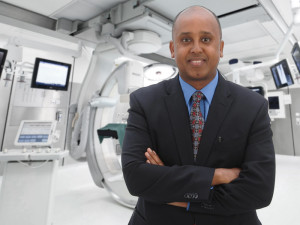Dr. Mustafa Ahmed with Southern Nevada Bariatrics with tips on after-effects of bariatric surgery that may come as a surprise
Las Vegas, NV (PRWEB) September 28, 2017
What would you normally expect after weight-loss surgery? To lose weight, of course – and lots of it. But many bariatric surgery patients are surprised by after-effects of their procedure they never expected, according to Mustafa Ahmed, MD, of Southern Nevada Bariatrics.
With approximately one-third of Americans coping with obesity – defined as a body mass index (BMI) of 30 or higher – weight-loss surgery has grown in prominence over recent years. About 180,000 people underwent some type of bariatric surgery in the United States in 2013, according to the American Society for Metabolic and Bariatric Surgery.
But regardless of which type of bariatric procedure a patient undergoes – Roux-en-Y gastric bypass, gastric banding or gastric sleeve surgery – they can expect a wide range of potential symptoms and/or conditions to deal with in the aftermath, explains Dr. Ahmed, who completed a bariatric fellowship and is board-certified in surgery and surgical critical care.
“Patients need to educate themselves by asking their doctors what to anticipate in the days, weeks and months after surgery,” he says. “Weight loss should be at the top of that list, but it’s a list that also encompasses many other possibilities.”
Possible post-surgical symptoms and conditions
There’s no one-size-fits-all approach to determining which after-effects of bariatric surgery patients will experience. But it’s a wide range, Dr. Ahmed says, and includes:
- Hiccups: Typically triggered by eating too much, drinking carbonated beverages or excessive alcohol consumption, nearly every weight-loss surgery patient experiences hiccups. “They’re just a nuisance, but if you want to avoid hiccups, portion out small amounts of food and eat slowly, chewing each bite thoroughly,” he says. “Also, avoid carbonated drinks and varying temperatures in drinks you’re consuming at one time – hot tea and ice water, for example.”
- Gas/flatulence: Everyone gets gas once in awhile, but this uncomfortable problem can occur more frequently in bariatric surgery patients due to eating or drinking rapidly, using straws, gulping, gasping, talking, chewing gum or smoking. “Burping is the most common way air leaves the stomach,” Dr. Ahmed explains. “To reduce gas, drink beverages slowly, don’t use a straw, and chew with your mouth closed.”
- Diarrhea or “dumping syndrome:” This is a very common effect of weight-loss surgery, often resulting in loose, watery and frequent stools in the days after surgery. So-called dumping syndrome refers to nausea, vomiting or diarrhea occurring after eating high-sugar meals after surgery, which can rush through the stomach.
- Constipation: On the flip side of diarrhea is constipation, which can occur on a chronic basis. To help avoid it, weight-loss surgery patients should make sure they’re properly hydrated as well as consume fiber and exercise regularly.
- Heartburn: This burning feeling in the chest and esophagus can occur for many reasons after bariatric surgery. “If you have the adjustable gastric band, it may be too tight,” Dr. Ahmed explains. “Otherwise, it’s best to avoid caffeine, spicy foods and overeating, and don’t lie down just after eating.”
- Hair loss: Thinning hair may occur in the first few months after your procedure, but if it persists 6 to 12 months later, a vitamin deficiency may be the culprit. Check your protein consumption and vitamin and mineral supplement recommendations with your doctor, Dr. Ahmed recommends.
- Alcohol tolerance: Many patients report that their tolerance to alcohol changes after weight-loss surgery, with blood alcohol levels staying higher even after drinking less alcohol.
- Gallstones: Common after quickly losing significant weight, gallstones are usually harmless but can cause nausea, vomiting and abdominal pain. Some bariatric surgery patients will need surgery to remove their gallbladder, Dr. Ahmed notes.
- Wound infections: This risk is highest in the 3 weeks after bariatric surgery, when incisions are fresh. Symptoms include redness or warmth around the incision area, or pain or thick drainage. Infections require antibiotics and sometimes necessitate further surgery.
- Vitamin deficiency risks: Patients aren’t able to obtain sufficient vitamins and minerals from food alone after weight-loss surgery, Dr. Ahmed says, so nutritional deficiencies are possible. “To combat that, your doctor will recommend vitamin and mineral supplements and lab tests to monitor your levels,” he adds.
- Changed eating habits: Weight-loss surgery requires a change in diet and approach to food to be optimally successful. Just after surgery, patients go through stages of eating liquid and then soft foods, Dr. Ahmed says. After that, your diet should be small portions of lean protein, vegetables and fruit. “You’ll also be advised to consume at least 64 ounces of certain fluids each day,” he says.
The best outcomes
Looking ahead to good results from weight-loss surgery is normal and natural, Dr. Ahmed says. “After all, the main idea is to lose a large proportion of your body weight, and feel and look better because of it,” he adds.
But aside from significant weight loss, many bariatric surgery patients experience incredible health effects from their procedure. For example, those with a weight-related medical condition, such as diabetes or sleep apnea, may experience improvements in those conditions. In some cases, those health problems disappear entirely.
“Nearly every surgery comes with less-than-ideal effects, and weight-loss surgery isn’t exempt,” Dr. Ahmed says. “However, the pros of this type of surgery typically far outweigh any temporary negative effects. Nearly all people who undergo bariatric surgery later say their lives have improved by far.”
Southern Nevada Bariatrics is a Las Vegas-based weight loss program offering patients individualized weight loss care. https://southernnevadabariatrics.com
Mustafa Ahmed, MD, is a board-certified physician in both surgery and surgical at Southern Nevada Bariatrics and also completed a bariatric fellowship.

